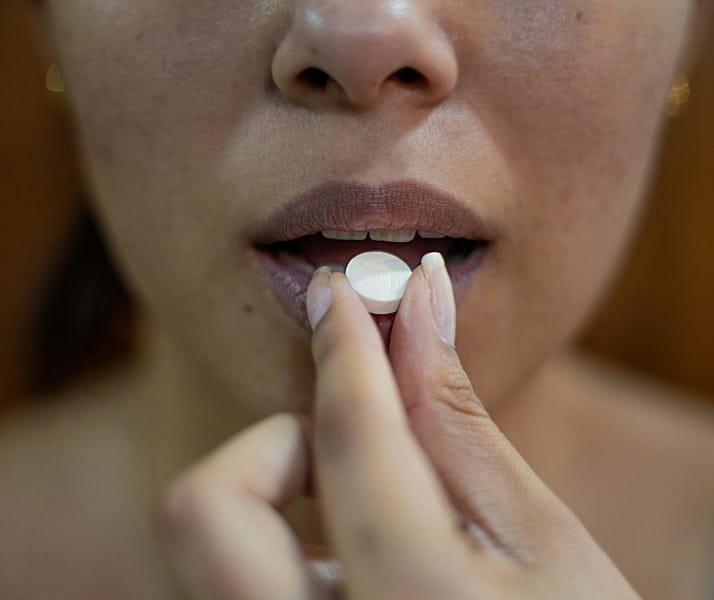In a groundbreaking study, researchers from Aarhus University have developed a molecule that could potentially revolutionize the way we approach physical fitness and health. This innovative compound, named LaKe, is designed to mimic the metabolic effects of intense exercise and fasting, offering a promising alternative for those unable to engage in rigorous physical activity[1].
The Science Behind LaKe
LaKe is a chemical fusion of lactate and ketone bodies, two substances naturally produced by our bodies during intense exercise and fasting. When we engage in strenuous physical activity or abstain from food for extended periods, our bodies increase the production of lactate and ketones. These compounds serve as efficient fuel for our cells, benefiting various organs and systems throughout the body[2].
Professor Thomas Poulsen from the Department of Chemistry at Aarhus University, one of the lead researchers behind the study, explains: "We have developed a molecule that can imitate the body's natural response to intense exercise and fasting. In practice, the molecule brings the body into a metabolic state equivalent to running 10 kilometers at a high pace on an empty stomach."
The development of LaKe is the result of a years-long collaborative effort between Professor Poulsen, Professor Mogens Johannsen from the Department of Forensic Medicine, and Professor Niels Møller from the Department of Clinical Medicine and Steno Diabetes Center Aarhus. All three researchers have extensive experience in metabolism studies from different perspectives[2].
How LaKe Works
When lactate and ketone levels in the blood rise, several beneficial physiological changes occur:
- Increased production of appetite-suppressing hormones
- Reduced levels of free fatty acids in the blood
- Improved cardiovascular health
- Enhanced cellular energy production
These effects contribute to reducing the risk of developing metabolic syndrome and other related health issues[2].
While it's possible to increase lactate and ketone levels through diet alone, it's challenging to achieve the necessary concentrations without unwanted byproducts such as acid and salt. This is where LaKe comes into play, offering a controlled and safe way to elevate these beneficial compounds in the body[2].
Potential Applications
The researchers envision LaKe as an advanced dietary supplement that could benefit various groups of people:
1. Those with limited mobility: Individuals who cannot follow a strict exercise regimen due to physical limitations or health conditions could potentially gain some of the benefits of intense exercise through LaKe supplementation[2].
2. Recovery support: People with heart conditions or general weakness might use LaKe to aid in their recovery process[2].
3. Cognitive enhancement: The molecule shows potential in alleviating concentration difficulties and may have applications in treating serious conditions such as Parkinson's disease and dementia. These conditions are often characterized by low energy levels in the brain, which LaKe might help address[2].
4. Traumatic brain injury treatment: Experiments have been conducted to increase lactate levels in individuals with concussions, as lactate can better take over glucose's role in the brain under stressed or traumatic conditions[2].
Current Research Status
The LaKe molecule has been tested on rats, and the first clinical trials on humans are currently underway at Aarhus University Hospital. If successful, these trials could pave the way for LaKe to become an advanced dietary supplement[2].
Professor Poulsen notes, "In a way, we're not surprised by the effect, as we're combining known substances. The innovation is that we've now created a molecule that allows us to artificially control the amounts of lactate and ketone bodies in a safe manner."
Expert Opinions and Concerns
While the potential of LaKe is exciting, some experts in the field express skepticism about its ability to fully replicate the benefits of exercise. Christoffer Clemmensen, an associate professor at the Faculty of Health Sciences at the University of Copenhagen, raises important questions about the feasibility of creating a pill or medication that can replace or mimic the beneficial effects of exercise[3].
Clemmensen points out that while it's true that lactate and ketone bodies increase during exercise, thousands of other molecules are also affected. He states, "I would seriously question whether it's even realistic to produce a pill or drug that can replace exercise or mimic its beneficial effects."
The associate professor also emphasizes that while it's an interesting topic that interests many, there's still a long way to go before it can be documented, and it's not a good idea to choose to forgo exercise[3].
Ethical Considerations and Future Implications
The development of LaKe raises several ethical questions and potential implications for society:
- Impact on public health: If widely adopted, could LaKe lead to a decrease in physical activity among the general population?
- Accessibility and equity: How will the cost and availability of LaKe affect its distribution among different socioeconomic groups?
- Doping in sports: Could LaKe be used as a performance-enhancing substance in competitive sports?
- Long-term effects: What are the potential long-term consequences of using LaKe as a substitute for natural exercise and fasting?
- Psychological impact: How might the availability of an "exercise pill" affect people's motivation to engage in physical activity and maintain a healthy lifestyle?
The Road Ahead
The LaKe molecule is currently undergoing an extensive approval process in the EU, which is expected to take about two years. If approved, the researchers anticipate that LaKe could enter the market in 2026 or 2027[3].
It's important to note that while LaKe shows promise, it is not intended to replace exercise entirely. Professor Poulsen emphasizes, "It's not an encouragement to do without exercise, but it can be a supplement to exercise."
As research continues and clinical trials progress, the scientific community and the public will eagerly await further results and insights into the potential of LaKe. While it may not be a magic pill that completely replaces the need for exercise, it could offer significant benefits to those who struggle with traditional forms of physical activity.
In the meantime, it's crucial to remember that a balanced diet, regular exercise, and proper rest remain the cornerstones of good health. As we look to the future of health and fitness, innovations like LaKe may provide valuable tools to supplement, but not replace, these fundamental practices.e















Member discussion